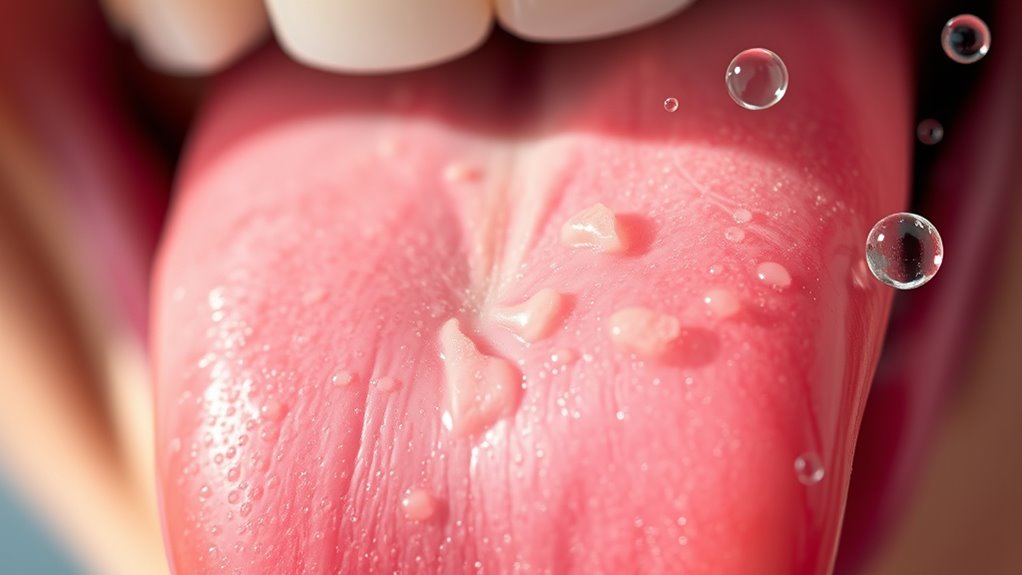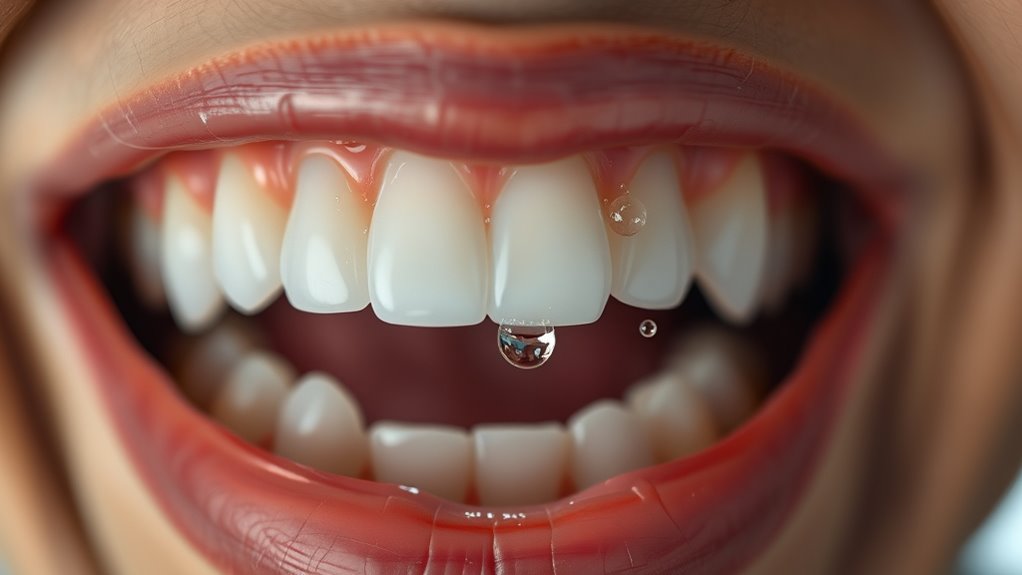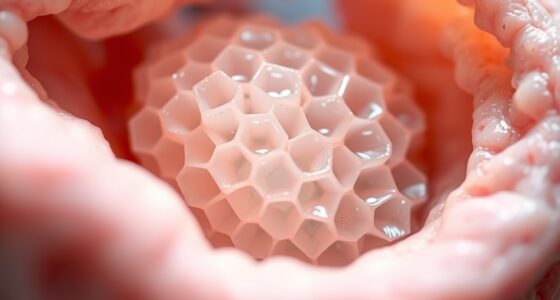People who never get cavities often have saliva that naturally balances bacteria, neutralizes acids, and supplies essential minerals like calcium and phosphate. This helps wash away food particles, prevent plaque buildup, and repair early tooth damage. Good saliva flow and pH regulation make their mouths less prone to acid attacks and enamel erosion. Maintaining healthy saliva is key to cavity resistance, and if you explore further, you’ll discover more about how saliva’s science protects your teeth.
Key Takeaways
- Individuals with high saliva flow effectively wash away food particles and bacteria, reducing cavity risk.
- Balanced saliva pH neutralizes acids from bacteria, preventing enamel erosion and cavity formation.
- Rich mineral content in saliva supports tooth remineralization, strengthening enamel against decay.
- Good overall health and hydration optimize saliva’s protective properties, lowering cavity susceptibility.
- Advanced research and technology help understand saliva’s role, leading to better cavity prevention strategies.

Saliva might seem like just a simple bodily fluid, but it actually plays a crucial role in your health and daily life. One of its key functions is managing the bacteria that live in your mouth. Your mouth hosts a complex community of microorganisms, known as mouth bacteria, which can either contribute to dental decay or help prevent it. People who rarely get cavities often have a natural ability to control these bacteria more effectively. Saliva helps by washing away food particles and bacteria, reducing their ability to stick to your teeth and form plaque. This cleansing action prevents the buildup of harmful bacteria that produce acids, which erode tooth enamel and cause cavities.
Another vital aspect of saliva’s role involves maintaining the pH balance in your mouth. The pH level indicates how acidic or alkaline your mouth is. When you eat sugary or carbohydrate-rich foods, bacteria in your mouth convert these into acids. If these acids linger, they lower the pH, creating an environment that promotes tooth decay. Fortunately, saliva contains buffering agents that neutralize these acids, restoring the pH to a healthier, more alkaline level. People who seldom suffer from cavities often have a saliva composition that is particularly good at maintaining this pH balance. Their saliva can quickly counteract acid attacks, preventing the prolonged acidity that damages enamel.
Beyond simply neutralizing acids, saliva also supplies minerals like calcium and phosphate, which aid in remineralizing teeth. This natural repair process is crucial for those who are exposed to frequent acid attacks. If your saliva is rich in these minerals and can swiftly restore a neutral pH, your teeth are better protected against decay. Conversely, if your saliva struggles to maintain pH balance or lacks sufficient minerals, your risk of developing cavities increases, even if you’re diligent with oral hygiene. Additionally, recent research indicates that the function and composition of saliva can be influenced by advanced technologies like robotics and automation, which could potentially be harnessed to improve oral health diagnostics and treatments in the future.
Your saliva’s composition and flow rate are influenced by factors such as hydration, diet, and overall health. Those with high saliva flow and a balanced pH are often more resistant to cavities because their mouths are less hospitable to harmful bacteria and acid attacks. So, while good brushing and flossing are essential, your saliva’s natural properties play an equally important role in cavity prevention. Understanding this, you can take steps to support your saliva production—staying hydrated, avoiding excessive sugar, and visiting your dentist regularly—to keep your mouth’s bacterial levels and pH balance in check.
Frequently Asked Questions
Can Genetics Influence Saliva Composition?
Genetics can influence saliva composition, affecting your cavity risk. Your genetic predisposition determines saliva variability, including factors like flow rate, pH, and mineral content. These differences can make your mouth more or less prone to decay. If your genes favor higher saliva production with neutral pH and mineral richness, you’re naturally better protected. Conversely, less suitable saliva traits may increase cavity risk, showing how your genetics play a role in oral health.
How Does Saliva Production Change With Age?
Imagine your mouth as a bustling river, flowing with saliva that keeps things balanced. As you age, this river may slow, changing saliva production. Saliva pH and enzyme activity can dip, making your mouth less hospitable. You might notice a drier, less vibrant flow, which can impact your oral health. Staying hydrated and practicing good habits helps keep your saliva lively, supporting your smile through the years.
Are There Specific Foods That Boost Saliva’S Protective Effects?
You can boost saliva’s protective effects by eating foods that promote flavor enhancement and texture modification, like crunchy fruits and vegetables, which stimulate saliva flow. Chewing sugar-free gum also helps increase saliva production. Incorporate foods rich in fiber and natural sugars, like apples or carrots, to naturally enhance saliva’s ability to neutralize acids and wash away bacteria, supporting your dental health and reducing cavity risk.
Does Hydration Level Affect Saliva’s Ability to Prevent Cavities?
Think of your mouth as a bustling city, with saliva acting as a vigilant guardian. When you’re well-hydrated, your saliva is less viscous, flowing freely to wash away bacteria and neutralize acids. Dehydration thickens saliva, reducing its protective powers and increasing cavity risk. Staying hydrated keeps saliva’s impact strong, ensuring your mouth stays a healthy, thriving city. Proper hydration is key to maintaining saliva’s cavity-fighting ability.
Can Medical Conditions Alter Saliva’s Cavity-Fighting Properties?
Medical conditions can definitely change how saliva fights cavities. Conditions like Sjögren’s syndrome reduce saliva production, affecting saliva pH and enzyme activity, which are essential for cavity prevention. When saliva’s pH drops or enzyme activity decreases, your mouth becomes more vulnerable to decay. So, if you have a health issue, it’s important to manage it, as it can weaken saliva’s natural cavity-fighting properties and increase your risk of cavities.
Conclusion
Imagine your mouth as a bustling city, with saliva as the vigilant guardian patrolling every corner. When you keep your saliva healthy, it acts like a shield, sweeping away harmful bacteria and neutralizing acids. This constant battle keeps cavities at bay, allowing your teeth to shine bright like stars in the night sky. So, take care of your saliva, and let it work tirelessly to protect your smile, keeping cavities out of sight and mind.









